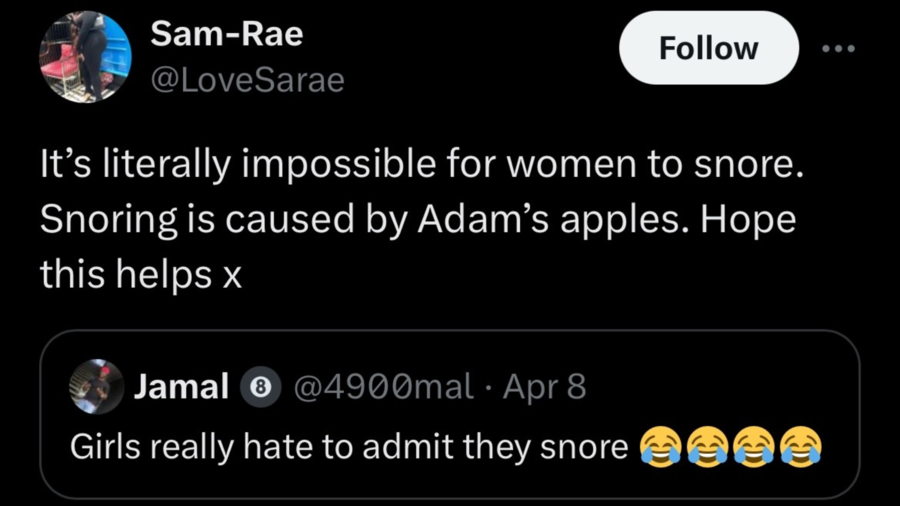STORY UPDATED: check for updates below.

Is it impossible for women to snore? No, that's not true: Besides no evidence to support that claim, a sleep medicine expert told Lead Stories, "Women are equally likely to snore compared to men." Statistics from the National Sleep Foundation and the American Academy of Sleep Medicine do show that more men than women report snoring but snoring affects both genders.
The claim appeared in a post (archived here) on X (formerly Twitter) by Sam-Rae on April 8, 2024. The post's caption said:
It's literally impossible for women to snore. Snoring is caused by Adam's apples. Hope this helps x
This is what the post looked like on X at the time of writing:
(Source: X screenshot taken on Thu Apr 11 14:44:55 2024 UTC)
The social media post provides no evidence to support its claim that it's "impossible for women to snore."
Lots of people snore
There's no shortage of Americans who snore. Both men and women do, although more men snore. The "Snoring" page on the Yale Medicine website (archived here) says:
As many as 90 million Americans report snoring at one time or another, while 37 million say they snore regularly.
The National Sleep Foundation (archived here) says 42 percent of men snore and 31 percent of women.
The numbers (archived here) from the American Academy of Sleep Medicine (AASM) are similar -- about 40 percent of adult men and 24 percent of adult women are habitual snorers.
Sleep experts
Dr. Indira Gurubhagavatula, chair of the AASM and director of the Sleep Medicine Fellowship at Penn Medicine's Veteran's Administration Medical Center, told Lead Stories in an April 11, 2024, email that "anyone can snore." She continued:
In fact, about half of people snore at some point in their lives.
Lots of people are not aware that they snore. Many people sleep right through their own snoring, and since they are not conscious when it is happening, they would not know. So, they rely on a bedpartner to tell them.
In an April 11, 2024, phone interview with Lead Stories, Dr. James McGuirk, an assistant professor of neurology in the Sleep Medicine Division at Vanderbilt University Medical Center, said, "Yes, women can snore. And they can snore just as loud as men can." He added:
I don't know the exact breakdown but it is more common in men ... and that's just based on the fact that sleep apnea of which snoring is often a sign is more common in men.
McGuirk continued, saying, if you snore, you should see a doctor:
Because snoring can be a sign of sleep apnea and sleep apnea can increase your risk for heart attack stroke, [and] high blood pressure.
Dr. Saiprakash Venkateshiah, a pulmonologist and staff physician at the Atlanta VA Medical Center, as well as the medical director of the VA pulmonary and sleep medicine clinics, told Lead Stories in an April 11, 2024, email that he is "amused by seeing the misinformation" surrounding women and snoring. He said, "Women are equally likely to snore compared to men."
Additionally, Venkateshiah cited this 2019 study (archived here) published by the Journal of Critical Sleep Medicine called "The Presence of Snoring as Well as its Intensity Is Underreported by Women."
Causes of snoring
The Mayo Clinic website (archived here) lists risk factors that may contribute to snoring but none include having an Adam's apple as the social media post suggests. These are the top potential things that may cause a person to snore:
- Being a man. Men are more likely to snore or have sleep apnea than are women.
- Being overweight. People who are overweight or obese are more likely to snore or have obstructive sleep apnea [OSA].
- Having a narrow airway. Some people may have a long soft palate, or large tonsils or adenoids, which can narrow the airway and cause snoring.
- Drinking alcohol. Alcohol relaxes your throat muscles, increasing the risk of snoring.
- Having nasal problems. If you have a structural defect in your airway, such as a deviated septum, or your nose is chronically congested, your risk of snoring is greater.
- Having a family history of snoring or obstructive sleep apnea. Heredity is a potential risk factor for OSA.
Updates:
-
2024-04-12T16:33:02Z 2024-04-12T16:33:02Z Adds context from Dr. Indira Gurubhagavatula and Dr. James McGuirk.


















